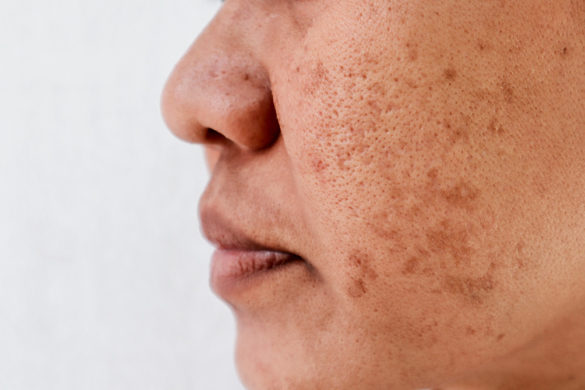 If you have noticed dark, blotchy, brown, confetti-like patches of skin on your forehead, upper lip and cheeks, you are most likely suffering from chloasma, also called Melasma. This type of Melasma is also called the mask of pregnancy, and affects 50-75% of expectant mothers.
If you have noticed dark, blotchy, brown, confetti-like patches of skin on your forehead, upper lip and cheeks, you are most likely suffering from chloasma, also called Melasma. This type of Melasma is also called the mask of pregnancy, and affects 50-75% of expectant mothers.
What causes Melasma?
This type of Melasma appears when a steep rise in oestrogen levels stimulate excess melanin. Melanin is responsible for determining skin and hair colour. Dark-skinned people have more melanin in their skin than light-skinned people. With this rise in melanin, your freckles and moles may also appear darker too, and a dark line may also appear down the centre of your abdomen. This is especially common in darker-skinned women, or those of Asian and African descent who already have more pigment in their skin. High exposure to sunlight can make the appearance of these brown patches worse.
Is the mask of pregnancy harmful to my baby?
Although the dark marks covering your face, and sometimes even your neck, chest, arms and legs, can take a huge toll on your self confidence, making you feel hideous at times, it does not actually cause any harm to your baby.
How can I get rid of pregnancy mask on my face?
The good news is that the discolouration is temporary and usually disappears after delivery or, in some cases, after you finish breastfeeding. However, treatment may be necessary in persistent cases.
Consult your doctor regarding the possible treatment methods to clear chloasma if it refuses to go away after your baby is born. However, most traditional treatment methods are not safe for breastfeeding women. Your doctor or dermatologist is likely to recommend non-prescription creams and natural remedies during the time you are breastfeeding. Topical treatments, chemical peels and laser treatments can be used if the problem persists after weaning.
What can you do to help?
- Eat foods that contain folic acid. Studies have shown that a folate deficiency can be related to hyper pigmentation (melasma). Folic acid can be found in green leafy vegetables, whole-wheat products and oranges.
- Protect your skin. Wear a high SPF, of at least 30. Use this everyday, focusing on your face, even if you are not planning to go outside. Harmful rays can still reach your skin through windows. Exposure to sunlight will make any patches of pigmentation worse.
- Do not use any peels, bleaches or other chemically based lightening products during pregnancy or while breastfeeding. These harmful chemicals can potentially penetrate the skin and be passed on to your child.


